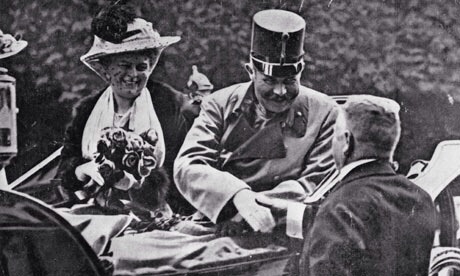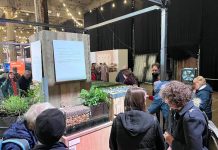About Manchester begins its series on the commemoration of the 1st World war with a look at the events that took place in Sarajevo one hundred years ago and what was happening in Manchester
It is not to be supposed that the death of the Archduke Franz Ferdinand will have any immediate or salient effect on the politics of Europe”, wrote the Manchester Guardian on the 30th June 1914.
Indeed the correspondents main concern was for the health of the Emperor Franz Joseph who was said to be ill and may not survive long enough for a successor to take his place.
There will though, he added,be a press campaign against Serbia and Slavs he continued, but this would hardly become serious unless the Emperors health was to deteriorate.
The previous day the paper had described him as an autocrat with populist tendencies in a two column piece following the assassination in Sarajevo. A simple and amiable man with a love of solitude who had visited Britain on several occasions most recently for the funeral of Edward the seventh, four years previously.
Just a fortnight previously in three sentences the paper had reported his meeting with the German Kaiser with the two, having taken tea in a Bohemian castle going for a drive in the grounds.
Little did the Manchester public know that the shots fired by a Bosnian Serb schoolboy lead to world war just one month later.
That weekend, the Manchester Evening news reported at the Manchester and Salford battalions had marched through the city
the men were of all ages and classes-some had obviously succeeded in making headway in civilian life, others had remained at the bottom of the industrial ladder but clearly they were all imbued with the pride of service.
A Rochdale man had been charged with attempting to commit suicide by throwing himself in front of a motor car
The paper devoted two columns to the events in Sarajevo, the catalogue of family troubles that had befallen the aged emporer of Austria is applying, reminding its readers that his brother Maximillian had been executed by the Mexicans, his eldest son had committed suicide and his wife had been assassinated.the news that his heir was now also dead
assuaged by a youthful fanatic meant that the sympathy of every living creature will be extended to this aging monarch”
reminding us of his words when his wife was killed
“Is there no sorrow known to the human race that I am to be spared.
Sarajevo, said the paper is unrivalled for its beauty of its position and its buildings its mosques and minarets
And with a nod to the next month it reminded Mancunians that the dead archduke was a conservative with a keen interest in naval and military questions and that only a fortnight earlier he had been entertaining the German Kaiser who counted him amongst his greatest friends.
The paper speculated that Austria would place further measures on the Slavs, that trouble may arise a few months later in Bosnia and that the would be a rapprochement between Russia and Serbia whilst Austria would fall mk re and more under the influence of the Kaiser.
That same weekend one of the most familiar figures at Salford Cattle market Laurenec Ingham master butcher from Bacup retired at the age of 87 having spent seventy years of his life working there.
Only seven prisoners appeared at the opening of the Manchester assizes reported e paper under the headline an a sense of crime in the city
And there were tips on how to keep safe during thunderstorms
” a single tree is affords little protection it says and in some cases has drawn destruction to those who have fled to it for shelter
The Archduke had chosen St Vitus day to visit the Bosnian capital.It was an important date in the Serbian calendar, their national day. It was his fourteenth wedding anniversary, his marriage had broken all the rules of the Imperial Household. He had married beneath him and his children had been disinherited, the price of marrying for love.
Usually his wife would rude at the back of imperial processions but Franz Ferdinand had picked Bosnia deliberately for here she could ride at his side.
He arrived three days earlier, inspecting troops, visiting the museum and taking drinks in the hotel.The visit was low key, when the Emperor had visited, two hundred suspects had been locked up but nobody suspected there was going to be any trouble this weekend. On the 28th, a Sunday, the formal part of the visit things would be so different.
A Bosnian student who had left school four weeks earlier, a nationalist, an idealist, had been attracted to a group called the Black Hand, a secret society, indirectly funded from Belgrade, who had been stirring up trouble since 1903. It prayed on drifters like Princip, six in all were lining the streets that faithful day.
There were a number of attempts, a bomb falling short, damaging a wheel and injuring one person, a gun jamming, another unable to detonate his bomb and another, who felt sorry for the couple and went home.
Princip, hearing the first explosion, thought the attempt had already succeeded, but when he saw the convoy continuing, thought of attempting suicide before going to a cafe and drinking coffee.
The procession continued to the Town Hall. A now angry Franz Ferdinand swore that Sarajevo would pay.He brushed aside the Mayor’s welcoming speech and returned to the car.The driver took a wrong turn and was forced to stop and turn around, as ill fortune would have it right in front of the cafe that Princip was sitting at. Seeing the convoy in front of him, he stepped forward, shooting the Archduke at point blank range, before hitting his wife.Both were dead within minutes and the disastrous chain of events would begin.







